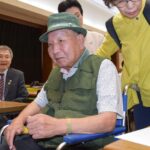The citizens of Papua New Guinea were prepared to throw a celebration in honor of the president of the United States.
Monday was designated a holiday, but the guest of honor did not appear.
On Monday, Joe Biden was scheduled to be the first US president to visit a Pacific Island nation. Still, he canceled his trip to concentrate on domestic issues and flew home from the G7 summit in Hiroshima.
Papua New Guinea (PNG) instead welcomed US Secretary of State Antony Blinken, but after six months of preparations, this was not the moment of historical significance they had hoped for.
Mark Brown, prime minister of the Cook Islands and chairman of the Pacific Islands Forum, said in a BBC interview, “It will be a disappointment for a number of Pacific leaders who had made special arrangements to be in Papua New Guinea to meet with him.”
Mr. Biden was due to sign a security pact with James Marape, the prime minister of Papua New Guinea. The agreement, ratified by Mr. Blinken and the Defence Minister of Papua New Guinea, Win Bakri Daki, grants US forces access to the country’s airfields and ports.
Additionally, tens of millions of dollars are pledged to enhance security cooperation.
With Vice President Biden returning home, now is not the time for the United States to disillusion leaders in this resource-rich and strategically important region.
Washington and Beijing compete for influence in the Pacific, and analysts characterize the United States as playing catch-up after years of neglect.
The 15 sovereign nations manage approximately twenty percent of the world’s oceans. These essential maritime routes transported supplies to Australia and New Zealand during World War II.
After the conflict, Western interests in the Pacific waned, while Chinese investments in the region increased.
Beijing has sent aid and invested in schools, roads, and bridges over the past decade to strengthen ties with several island nations.
Mr. Blinken arrived via a six-lane Chinese-built highway in Port Moresby, Papua New Guinea.
The Solomon Islands signed a security pact with Beijing last year, prompting concerns that China could establish its first military base in the region, significantly expanding its military’s reach.
He stated that the West is now paying “increased attention” to the requirements of Pacific development. “I believe we appreciate that. But we also applaud Secretary Blinken’s statement that he would like the United States to be the Pacific nations’ preferred development partner.”
Analysts are concerned, however, that Washington may need to do more to convince the Pacific Island nations that they are sincere about becoming partners.
Last year, the acting prime minister of Fiji told Secretary Blinken that island nations felt like “small dots” to Western leaders traveling to meetings where they “spoke about us, as opposed to with us.”
President of Beijing Xi Jinping was present. In 2018, he traveled to Papua New Guinea four years after paying a state visit to Fiji.
In response to Beijing’s growing presence in the region, the United States reopened its embassy in the Solomon Islands, which had been closed for 30 years, earlier this year.
The Australian defense and foreign ministers have recently visited several island nations as part of a diplomatic drive.
However, while Pacific Island leaders appreciate the attention, they have other concerns.
Mr. Brown stated, “We don’t want our region to be a battleground between our development partners; rather, we want to find areas of collaboration where we can have the best support to achieve our development and climate goals.”
“The most important thing is that China and the United States do not need to work together; they must work with us.” There is ample capacity for all partners to enter the Pacific and assist us in achieving our development objectives.”
Instead of being trapped between the two superpowers, the islands could benefit from this heightened interest.
Gordon Peake, the principal adviser for the Pacific Islands at the United States Institute of Peace, told AFP News Agency, “Pacific governments are relishing their moment in the spotlight.”
“Many of our Pacific countries have well-established diplomatic relations with China,” Mr. Brown told the BBC.
“China has helped Pacific nations achieve their development goals by filling a void in the development realm.”
“‘Friends to all, enemies to none’ is the unofficial foreign policy credo of the majority of Pacific nations, which they adhere to to great effect.”
The key for the Pacific Island nations will be to pique the interest of the United States and China in their priorities.
Mark Brown, the prime minister of the Cook Islands, attended the G7 summit as an extra guest over the weekend, where the leaders of the world’s wealthiest democracies intensified their response to what they described as Beijing’s escalating military and economic threats.
However, very little was known about how the Group of Seven would address the global climate crisis.
The Pacific Islands are very vulnerable to rising seas and intense cyclones, and the oceans are essential to their way of life because they are the source of their culture, food, jobs, and national economies.
“I don’t think climate change is something that’s coming up in the future. I think it’s something we live with every year, every season. It makes hurricanes, storms, floods, and other extreme weather worse in our country. It also makes droughts worse,” Mr. Brown said.
“Our word is that you should listen to the Pacific. Listen to the call to do more to stop climate change. Over a number of years, this theme has been repeated in a number of places. We just need to keep going.”
When Mr. Blinken goes to PNG on Monday to meet with leaders from the Pacific Islands Forum, they will keep spreading this message.
Now, these countries, which are often overlooked, are being heard on the most significant international stages in the world.
And they plan to take advantage of it.














